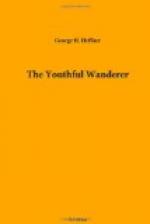Theatres, Operas
and other places of amusement of the great capital of the social world. Places of amusement are the leading feature of Paris, and a boundless variety, adapted to the wants and tastes of every class of society, are strewn in endless profusion all over the city. The concert season lasts almost all the year round, though the highest class are limited to the winter and spring. Masked balls take place throughout the Carnival, in the winter season, and are thus spoken of and described by Galignani: “The most amusing are at the Opera-house, where they begin at midnight and continue till daybreak. No stranger who visits Paris at this season of the year should omit a visit to one of the Bals masques at this theater, for it is difficult to imagine a scene more curious and fantastic than that presented in the Salle of the Grand Opera at a Carnival Ball. On these nights the pit is boarded over and joins the stage; the vast area of the whole theater forming a ball-room of magnificent proportions, which, brilliantly lighted, and crowded with thousands of gay maskers attired in every variety of colour and costume, forms a sight not easily forgotten. Ladies should not go except as spectators in a box and under the protection of their relatives. The ticket costs $2.00. To witness this scene in perfection the visitor should wait until 12 or 1 o’clock, when the company is completely assembled and the votaries of the dance are in full activity. On entering the vast salle at such a moment the effect is scarcely imaginable, the gorgeousness of the immense theater, the glitter of the lights, the brilliancy and variety of the costumes, the enlivening strains of music, the mirth of the browd, and, above all, the the untiring velocity with which the dancers whirl themselves through the mazes of the waltz, polka and mazourka, present an appearance of bewindering gayety not to be described. * * * * On some occasions of special enthusiasm the crowd take up the leader of the orchestra with the most frantic plaudits, and in more than one instance have carried him in triumph round the theater. It is scarcely necessary to add that at these balls the roue (profligate) may find an endless variety of pleasant adventures.” On some days during the Carnival, crowds of masked persons, exhibiting all sorts of antics, appear in the streets, and people assemble on horseback, in carriages and on foot, to witness the scene.
“The Carnival was prohibited in 1790, and not resumed till Bonaparte was elected first consul.” Great was the joy of the Parisians when the Carnival was again restored!




